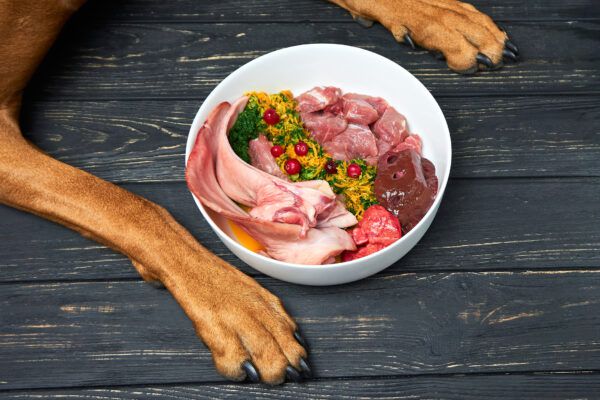Can Dogs Eat Raw Meat? – Dogster
Generally speaking, most raw or gently cooked meat is safe for dogs, with the exception of some fish and pork. Dogs have highly acidic stomachs and natural digestive enzymes and bile that help them process bacteria without becoming ill. Your dog’s digestive system can handle eating raw meat.
Just like the meals you prepare for yourself; your dog’s meals need to be balanced and complete. Lissa Cannady, RVT, Hospital Manager for VCA, says this is best determined by a veterinary nutritionist, who can ensure that the meal contains all the nutrients that your pet needs to thrive. How much meat to feed your dog will be based on his caloric needs. Work with your vet or a veterinary nutritionist before adding raw meats to your dog’s diet.
Can dogs eat raw chicken or beef?
Yes, raw chicken and raw beef are both safe for dogs. Dogs can eat a wide variety of raw-fed or gently cooked meat.
Raw meat that’s safe for dogs includes:
- chicken
- beef
- bison
- turkey
- rabbit
- buffalo
Rare raw meats that are safe for dogs include: alpaca, llama, elk, deer, moose, reindeer, goat, mutton and venison. Raw duck, geese, quail, ostrich and emu are also safe for dogs.
Limit these raw fish for dogs
Raw mackerel, sardines, trout and salmon are safe to feed your dog occasionally as a treat. These fish may contain high levels of pollutants so limit them. We advise cooking fish to nullify the effects of thiaminase, an enzyme that inhibits nutrient absorption.
Do not feed raw pork to dogs
Do not feed raw pork to your dog; always cook it first. This is a better-safe-than-sorry rule as undercooked or raw pork could give your dog trichinosis (basically a parasitic worm, Trichinella spiralis). However, the CDC does say that U.S.’s better pork production laws and the public’s awareness of not eating raw or undercooked pork have caused these infections to be less common now.
Feeding dogs raw meat safety tips
Always follow proper safety precautions when preparing your dog’s raw meat meals:
- Keep it refrigerated if you are not using it right away
- Defrost meat in your refrigerator not in the sink or on the counter
- Follow all safe-handling instructions on the label
- Wash your hands before and after handling the raw meat
- Clean and disinfect everything the raw meat touches when you prepare it, like your dog’s food bowl, cutting board, knives, etc.
Check out the Safe Food Handling tips from the US Food & Drug administration.
Feeding raw meats for dogs with food sensitivities
Protein is the base of any dog’s diet, but not every dog can eat every type of protein. Meat protein will be the majority of your dog’s meal, but choosing proteins for your dog will be determined by your dog’s health needs. If your dog has food allergies or certain health problems, avoid some types of meats. Discuss which ones to avoid with a veterinary nutritionist.
Work with your veterinary nutritionist for a “balance-over-time” plan that rotates meats with fruits, vegetables and grains in each meal to provide all the amino acids, vitamins and minerals your dog needs to stay healthy.
Read our article on three types of raw food diets for dogs and rules for raw food diets.




